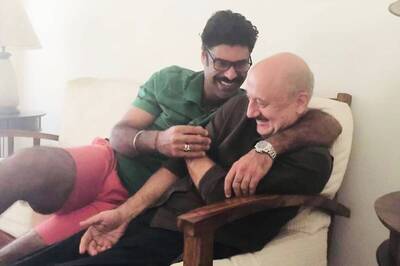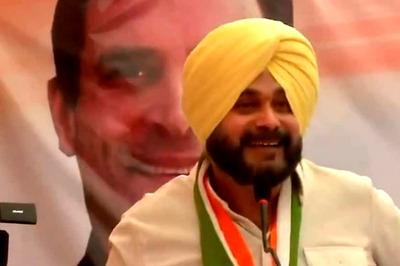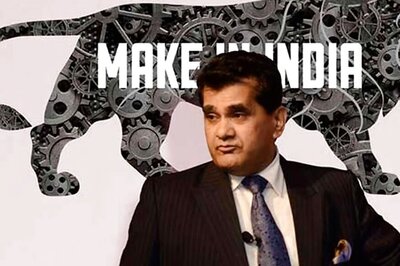
views
Cairo: Egypt's prime minister says he will reshuffle his Cabinet within a week, but doesn't say which ministers he'll replace.
Monday's announcement by Prime Minister Essam Sharaf comes amid rising public anger over the slow pace of reform since the ouster of Hosni Mubarak in February.
Sharaf also called for swift trials of members of the security forces suspected in the killings of nearly 900 Egyptians during the anti-Mubarak uprising.
A Cabinet reshuffle would be Egypt's fourth since Mubarak's ouster. The country is being led by interim rulers who are to pave the way for fall elections.
Since the weekend, protest tent camps have sprung up in key Egypt cities, with demonstrators saying they won't leave until they see radical reforms.
THIS IS A BREAKING NEWS UPDATE. Check back soon for further information. AP's earlier story is below.
CAIRO (AP) - The head of Egypt's security forces has defied orders by the prime minister to fire police officers accused of killing protesters during the nation's popular uprising, in a dispute illustrating the strains of a government facing escalating public pressure to bring former regime figures to justice.
Egyptians have again taken to the streets, furious over the failure to cleanse the tainted police and over a leadership they complain is botching an already chaotic transition to democracy. Protesters have camped out in main squares in Cairo, Suez and other cities since Friday, demanding the resignation of the interior minister who heads the police, the purging of former regime loyalists from the civil service and greater action to tackle economic woes.
The issue of justice for protesters slain during the 18-day uprising that led to Hosni Mubarak's Feb. 11 is the most explosive amid rising frustration with the handling of the political transition by the military generals who now lead the country.
Prime Minister Essam Sharaf, who heads a caretaker civilian government, has found himself caught in the middle.
Over the weekend, seeking to calm street demonstrations, he called for Interior Minister Mansour el-Issawi to fire 400 police officers accused of killing protesters. Nearly 900 people were killed during the uprising.
But el-Issawi balked, saying summarily firing them would be illegal.
The dispute has put Sharaf's credibility on the line. He was brought into office by the military to the acclaim of activists who led the anti-Mubarak uprising who saw him as a pro-reform figure. Taking his post, Sharaf proclaimed that his legitimacy came from the "revolution." But the dispute underlined the growing complaints among protesters that Sharaf is took weak to carry out reforms, with many accusing the military and former regime figures in the powerful security forces of preventing him from action.
Sharaf said on his official Facebook page that he would announce changes in his Cabinet late Monday. He did not specify whether el-Issawi would be among those removed.
Fueling the resentment in the streets is a deepening distrust of the ruling generals, whom activists accuse of a lack of transparency in directing the transition to democracy and of showing too much deference to Mubarak, allowing the 83-year-old former leader to remain in hospital at a Red Sea resort when he is under arrest and scheduled to stand trial next month.
The public is also growing impatient with high crime rates, unemployment and economic woes worsened by the post-revolution turmoil. The crisis has eaten into the country's already battered investment climate, with the benchmark stock index dropping almost 3 percent on Monday on concerns of mounting unrest.
The release on bail last week of seven police officers on trial for killing protesters in Suez sparked days of rioting in the canal city 60 miles (100 kilometers) east of Cairo.
"We have all the evidence that prove police officers killed the protesters," said Ali el-Genadi, father of one of the slain protesters in Suez. "We are not against the law, but we are against the judges who implement the law."
Cleansing of the police force and the dismissal of el-Issawi top the list of demands made by tens of thousands of protesters who took to the streets in Cairo and a string of other cities Friday in some of the largest demonstrations since Mubarak's ouster. A hard core of protesters have camped out in Cairo's central Tahrir Square since, blocking the major traffic intersection, vowing to stay until their demands are met. Larger protests have also been called for Tuesday.
Police officers contend their force is being unfairly maligned.
Ahmed Ragab, a spokesman for an association of police officers, said Sharaf's order for the officers' dismissal violated the law and unjustly equated officers who defended police stations against attacks by armed mobs during the uprising and snipers who shot protesters dead in cold blood from rooftops.
"We too demand retribution for the martyrs of the revolution," said Ragab, who says his association has the support of some 15,000 police officers, or about half of all the officer corps in the force. "Why is that no one is talking about the snipers?"
Justice for those killed during the protests is tangled into the deeper issue of reforming a police force that was widely despised during Mubarak's rule for human rights abuses and corruption. Police disappeared from the streets three days into the uprising in January following deadly clashes with protesters in Cairo and elsewhere in the country. That prompted a wave of looting, arson, jail breakouts and attacks on police stations around the nation.
Five months later, the police have yet to return, raising accusations that they are intentionally allowing chaos in retaliation for the revolution and in hopes of retaining their past power. Official figures show armed robberies surging to 208 in May from 36 in January and 145 murders in May compared to 44 in January. Media frequently tell of Egyptians trying to report car thefts and other crimes to police, only to be told at police stations to handle it themselves.
"Negligence by the police is a harrowing conspiracy," prominent activist and best-selling novelist Alaa al-Aswany wrote recently in Cairo's al-Masry al-Youm daily. "Policemen are standing by to watch and gloat."
Interior Minister el-Issawi has taken a more low-key approach to change. He is looking into retiring more than two dozen top police commanders, some of whom have been associated with the brutal suppression of the protests in January and February, according to Egypt's official Middle East News Agency.
It said those to be pensioned off include seven of el-Issawi's assistants and several current and former provincial security chiefs.
He has created offices for rights groups at the Interior Ministry to monitor police operations and has been urging police personnel to do away with the culture of abuse.
"If you respect citizens, they will respect you back," he told a recent graduation ceremony of policemen. "We get our wages from the taxes they pay."
The steps - which activists dismiss as too timid - so far have done little to soothe popular discontent with the police.
But some acknowledge that instilling a respect for human rights cannot be done quickly.
"The officer who is used to operate unchallenged, abusing motorists at police checkpoints, is not going to be a nice guy just like that," said Negad Borai, a prominent lawyer and rights activist. "It's an entrenched police culture that will take time to change."




















Comments
0 comment